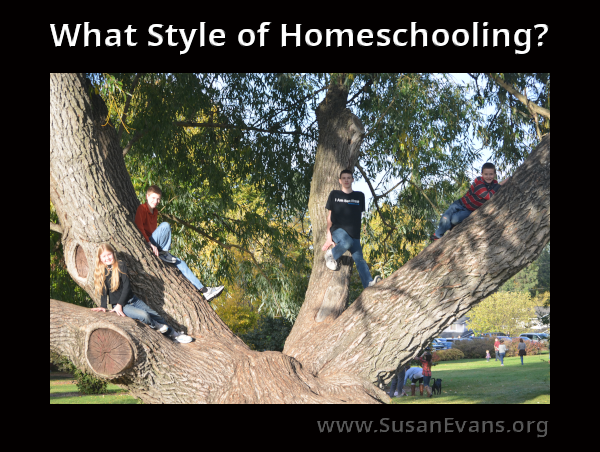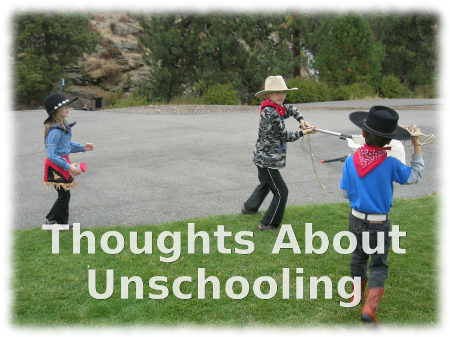What style of homeschooling fits your family the best? Here is a crash mini-course that describes each style of homeschooling, along with the pros and cons. It’s important to understand what type of homeschooling suits your family the best. It will depend on your own philosophy of education, and well as the learning styles and personalities of your kids.
1. Textbook Approach
Textbook Approach:
– Uses textbooks and workbooks to teach all subjects.
– Highly structured, age-graded with scope and sequence.
Pros:
– Feels like a safe choice because the schools use it.
– If not sure about homeschooling, easier to transition back to school.
– Great for math for all ages (systematic) and high school sciences.
Cons:
– A huge amount of material is covered in a superficial way.
– The same topics are covered year after year.
– Information-dense reading is lifeless compared to living books and real-life projects.
– Tests and quizzes are based on trivia; original thinking is discouraged.
– Lots of grading for the parent; the school day lasts longer than most other approaches.
2. Classical Education
Classical Education
– Emphasizes classical literature, the study of Latin, and the Trivium:
– Grammar stage: (ages 6-10) Mastery of facts through memorization.
– Dialectic stage: (ages 10-14) Study of logic.
– Rhetoric stage: (ages 14-18) Proficiency in written and spoken language.
Pros:
– Well-rounded education that teaches children how to think.
– Students are able to converse in a highly intelligent way; easier to get into Harvard.
Cons:
– Mental fatigue from a long school day crammed with the maximum amount of academics.
– Many students have difficulty with Latin, which is a dead language. Spanish or other modern-day languages can teach the same root words and be useful in life.
– Children are pushed so hard that they don’t have time to develop their own pursuits and hobbies.
3. Charlotte Mason
Charlotte Mason
– Living books; no twaddle; short lessons; narrations.
– Nature study and notebooking.
– Fine arts, music, and poetry.
Pros:
– Whole literature books rather than the usual excerpts in textbooks help the child to experience a work rather than just taste it. The reading is more interesting and not dry.
– Reading aloud and having children do open-ended nature study outside doesn’t require much energy for the parent.
Cons:
– Some topics that require study don’t have living books. Comprehensive study of chemistry, for example, requires a textbook and not just a living biography.
4. Unit Studies
Unit Studies
– Integrate all subjects into one theme.
– Splash into one topic deeply until you master it.
– Hands-on activities and field trips.
Pros:
– Greater retention of material because of immersion into subject.
– Students of all ages learn together and do assignments on different levels.
– Hands-on activities cause children to master the topic rather than just read about it.
– Encourages creativity and open-ended projects based on the subject.
– All learning styles are addressed, especially kinesthetic and visual learners.
Cons:
– More labor-intensive to plan and set up hands-on activities.
– Some students don’t like hands-on activities and would rather read or write about the topic.
– Easy to leave out major topics of study if not systematically covering the topics.
5. Unschooling
Unschooling
– Unstructured and informal.
– Surround the child with a rich environment of learning opportunities.
Pros:
– Natural curiosity of the child is not squashed.
– Freedom to pursue interests as subjects of study.
– Not fatigued from formal study; their mind can process what they’re interested in.
Cons:
– Lack of systematic instruction, especially in skill areas, causes academic weakness.
– Natural laziness of human nature; student will not study what is necessary to learn unless instructed to do so.
– Leads to weakness in character because they only do what they feel like doing.
6.Computer
Computer-Based Education
– Using computer discs or online classes for education.
Pros:
– Self-grading.
– No work whatsoever for the parent.
– Interactive with cartoons and positive re-enforcement.
Cons:
– No interaction with the family; each student isolated from the others.
– No common base of learning; lack of discussion.
– Lack of real-life and hands-on projects.
Hopefully one or more of these styles of education fit your family. Let me know in the comments, which combination of styles is your favorite!





